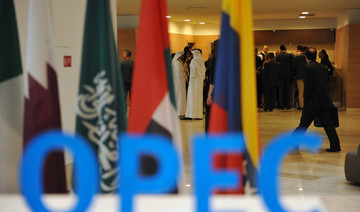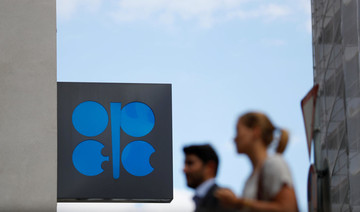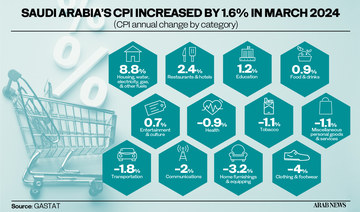ALGIERS: OPEC’s leader Saudi Arabia and its biggest oil-producer ally outside the group, Russia, ruled out on Sunday any immediate, additional increase in crude output, effectively rebuffing US President Donald Trump’s calls for action to cool the market.
“I do not influence prices,” Saudi Energy Minister Khalid Al-Falih told reporters as OPEC and non-OPEC energy ministers gathered in Algiers for a meeting that ended with no formal recommendation for any additional supply boost.
Benchmark Brent oil reached $80 a barrel this month, prompting Trump to reiterate on Thursday his demand that the Organization of the Petroleum Exporting Countries lower prices.
The price rally mainly stemmed from a decline in oil exports from OPEC member Iran due to fresh US sanctions.
“We protect the countries of the Middle East, they would not be safe for very long without us, and yet they continue to push for higher and higher oil prices! We will remember. The OPEC monopoly must get prices down now!” Trump wrote on Twitter.
Falih said Saudi Arabia had spare capacity to increase oil output but no such move was needed at the moment.
“My information is that the markets are adequately supplied. I don’t know of any refiner in the world who is looking for oil and is not able to get it,” Falih said.
However, he signalled Saudi Arabia stood ready to increase supply if Iran’s output fell: “Whatever takes place between now and the end of the year in terms of supply changes will be addressed.”
Russian Energy Minister Alexander Novak said no immediate output increase was necessary, although he believed a trade war between China and the United States as well as US sanctions on Iran were creating new challenges for oil markets.
Oman’s Oil Minister Mohammed bin Hamad Al-Rumhy and Kuwaiti counterpart Bakhit Al-Rashidi told reporters after Sunday’s talks that producers had agreed they needed to focus on reaching 100 percent compliance with production cuts agreed in June.
That effectively means compensating for falling Iranian production. Al-Rumhy said the exact mechanism for doing so had not been discussed.
The statement from Trump, meanwhile, was not his first criticism of OPEC.
Higher gasoline prices for US consumers could create a political headache for Republican Trump before mid-term congressional elections in November.
Iran, OPEC’s third-largest producer, has accused Trump of orchestrating the oil price rally by imposing sanctions on Tehran and accused its regional arch-rival Saudi Arabia of bowing to US pressure.
On Sunday, Iranian Oil Minister Bijan Zanganeh said Trump’s tweet “was the biggest insult to Washington’s allies in the Middle East.”
OPEC OUTPUT FALLS AGAIN
Seeking to reverse a downturn in oil prices that began in 2014, OPEC, Russia and other allies decided in late 2016 to reduce supply by some 1.8 million barrels per day (bpd).
In June this year, however, after months of cutting by more than their pact had called for, largely due to involuntary reductions from Venezuela and other producers, they agreed to boost output by returning to 100 percent compliance.
That equates to an increase of about 1 million bpd, but latest data show they are some way from achieving that target.
In August, OPEC and its allies cut production by 600,000 bpd more than their pact required, mainly as a result of falling output in Iran as customers in Europe and Asia reduced purchases ahead of the US sanctions deadline.
Iran told OPEC its production had been steady in August at 3.8 million bpd. OPEC’s own estimates, according to its secondary sources such as researchers and ship-trackers, put Iranian output at 3.58 million bpd.
Falih said returning to 100 percent compliance was the main objective and should be achieved in the next two-three months.
Although he refrained from specifying how that could be done, Saudi Arabia is the only oil producer with significant spare capacity.
“We have the consensus that we need to offset reductions and achieve 100 percent compliance, which means we can produce significantly more than we are producing today if there is demand,” Falih said.
“The biggest issue is not with the producing countries, it’s with the refiners, it’s with the demand. We in Saudi Arabia have not seen demand for any additional barrel that we did not produce.”
OPEC also decided on Sunday to adjust the dates of its next meeting to Dec. 6-7 from the earlier-agreed Dec. 3.
The joint OPEC/non-OPEC ministerial monitoring committee will next meet on Nov. 11 in Abu Dhabi.
OPEC, Russia rebuff Trump’s call for immediate boost to oil output
OPEC, Russia rebuff Trump’s call for immediate boost to oil output
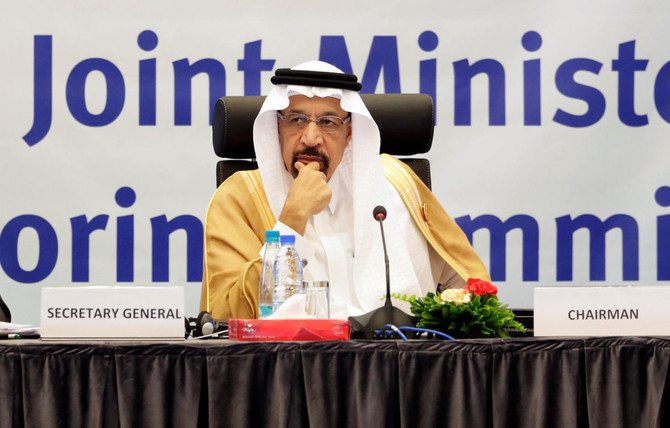
Global airline body calls for release of $720 million in held revenues by Pakistan, Bangladesh
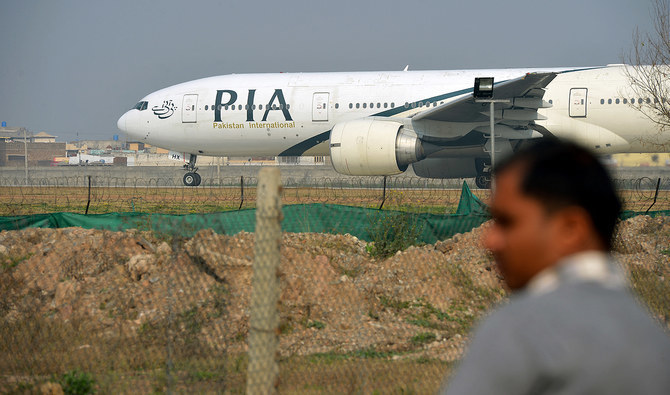
- IATA asks Pakistan in a statement to simplify the ‘onerous’ repatriation process causing ‘unnecessary delays’
- The international organization says airlines are unable to repatriate $399 million from the Pakistani market alone
KARACHI: The International Air Transport Association (IATA) on Wednesday asked Pakistan and Bangladesh to release airline revenues amounting to $720 million, saying the two countries were holding it in contravention of international agreements.
IATA, an international organization representing the global airline industry, asked Pakistan to simplify the “onerous” repatriation process involving audit and tax exemption certificates in a statement, pointing out such procedures caused “unnecessary delays.”
Bangladesh, it said, had a more standardized system, though aviation needed to be a higher central bank priority to facilitate access to foreign exchange.
“The situation has become severe with airlines unable to repatriate over $720 million ($399 million in Pakistan and $323 million in Bangladesh) of revenues earned in these markets,” the statement informed.
IATA’s regional vice president for Asia-Pacific Philip Goh emphasized that the timely repatriation of revenues to different countries was critical for payment of dollar denominated expenses such as lease agreements, spare parts, overflight fees and fuel.
“Delaying repatriation contravenes international obligations written into bilateral agreements and increases exchange rate risks for airlines,” he said. “Pakistan and Bangladesh must release the more than $720 million that they are blocking with immediate effect so that airlines can continue to efficiently provide the air connectivity on which both these economies rely.”
Goh maintained that his organization recognized the two governments were facing difficult challenges, making it necessary for them to determine how to utilize foreign currencies strategically.
“Airlines operate on razor-thin margins,” he continued. “They need to prioritize the markets they serve based on the confidence they have in being able to pay their expenses with revenues that are remitted in a timely and efficient fashion.”
He pointed out reduced air connectivity limited the potential for economic growth, foreign investment and exports, adding such large sums of money involved in the Pakistani and Bangladeshi markets necessitated urgent solutions.
Saudi Arabia to develop 320k new hotel rooms by 2030: Knight Frank
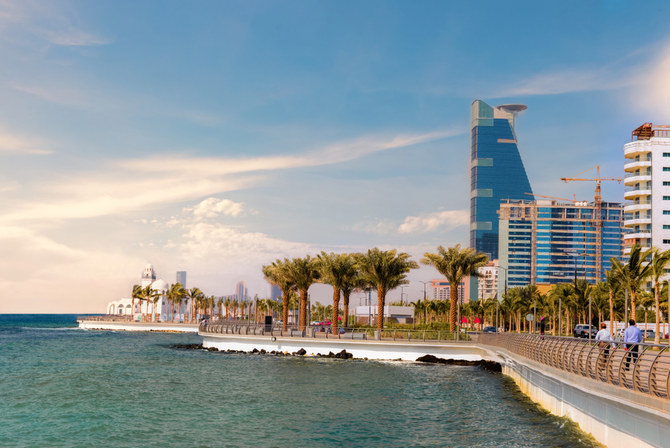
RIYADH: Saudi Arabia is gearing up to expand its hospitality sector by developing 320,000 new hotel rooms by 2030, according to an analysis by global property giant Knight Frank.
The consultancy’s study disclosed that as much as 67 percent of the planned hotel room supply in the Kingdom would fall in the “upscale” or “luxury” categories, referring to 4-star and 5-star accommodations, respectively.
This move aims to cater to the projected surge in tourism, with 150 million domestic and international tourists expected by 2030.
“With a target of welcoming 150 million visitors by 2030—a 50 percent increase from its previous goal—the government is actively exploring various strategies to attract to international travelers,” Partner and Head of Hospitality at Tourism and Leisure Advisory in Middle East and Africa Turab Saleem said.
Saleem noted that this includes the development of cultural and entertainment offerings nationwide, which complement existing attractions like the Jeddah F1 Grand Prix and numerous entertainment seasons.
“Noteworthy additions include theme parks such as Boulevard World in Riyadh, alongside the licensing of 24 additional theme parks by the Saudi General Entertainment Authority over the past year,” he added.
Oil Updates – prices climb amid US stocks decline, Middle East conflict
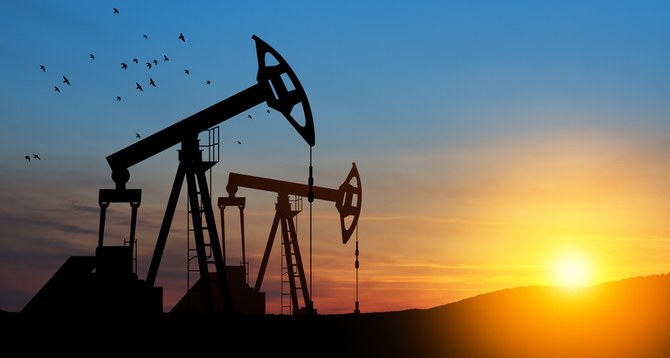
TOKYO: Oil prices extended gains on Wednesday after industry data showed a surprise drop in US crude stocks last week, a positive sign for demand, though markets were also keeping a close eye on hostilities in the Middle East, according to Reuters
Brent crude futures rose 26 cents, or 0.29 percent, to $88.68 a barrel and US West Texas Intermediate crude futures climbed 26 cents, or 0.31 percent, to $83.62 a barrel at 9:34 a.m. Saudi time.
US crude inventories fell 3.237 million barrels in the week ended April 19, according to market sources citing American Petroleum Institute figures. In contrast, six analysts polled by Reuters had expected a rise of 800,000 barrels.
Traders will be watching for the official US data on oil and product stockpiles due at 5:30 p.m. Saudi time for confirmation of the big drawdown.
US business activity cooled in April to a four-month low, with S&P Global saying on Tuesday that its flash Composite PMI Output Index, which tracks the manufacturing and services sectors, fell to 50.9 this month from 52.1 in March.
“This could help convince policy makers that rate cuts are required to support the economy,” ANZ analysts said in a note.
US interest rate cuts could bolster economic growth and, in turn, demand for oil from the world’s top consumer of the fuel.
Analysts were still bullish that any latest developments in conflicts in the Middle East will still support markets, though the impact on oil supplies remains limited for now.
“Overall, crude oil prices are well supported around current levels by on-going Middle East risk premium. On the topside, risk of possible renewed OPEC production increase from Jun will help limit any significant upside,” said head of markets strategy for United Overseas Bank in Singapore Heng Koon How.
“We maintain our forecast for Brent to consolidate at USD 90/bbl by end of this year,” Heng added.
Israeli strikes intensified across Gaza on Tuesday, in some of the heaviest shelling in weeks.
“Recent reports suggest that both Iran and Israel consider the current operations concluded against one another, with no follow-up action required for now,” ING analysts said in a note.
“The US and Europe are preparing for new sanctions against Iran – although these may not have a material impact on oil supply in the immediate term,” they added.
Pakistan Stock Exchange hits record high, breaks 72,000 points in intraday trade
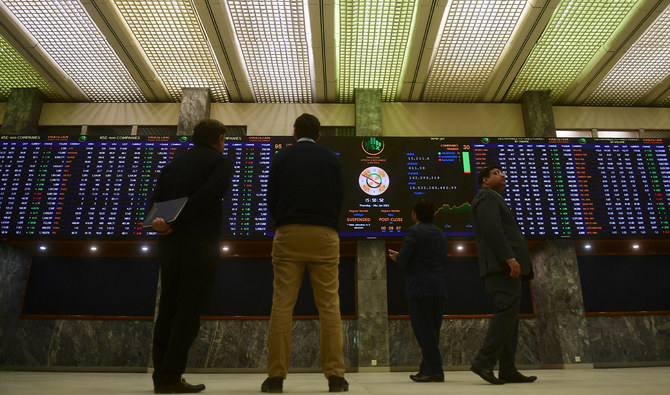
- Analysts say investors expect a significant decline in April inflation data that may lead to a cut in interest rates
- The Pakistani bourse has recently been trading at record highs due to hopes of positive loan talks with the IMF
ISLAMABAD: Pakistan’s benchmark share index breached the key level of 72,000 to trade at a record high of 72,414 points during intraday trade earlier on Wednesday, according to data from the Pakistan Stock Exchange website.
The Pakistani bourse has recently been trading at record highs amid positive sentiment prevailing among investors due to hopes of the country’s successful talks with the International Monetary Fund (IMF) for a new loan program.
The country’s finance minister, Muhammad Aurangzeb, recently visited Washington to hold talks with IMF officials for a long-term bailout facility as Pakistan’s current $3 billion program is due to expire this month.
The finance minister expressed hopes the outline of the new program would soon become visible, adding that the loan would help Pakistan continue with structural economic reforms.
“After a record current account surplus, investors are now expecting a big fall in April inflation data that may result in a cut in interest rates in the coming months,” Sohail Mohammed, CEO of Karachi-based brokerage company Topline Securities, told Reuters.
Pakistan’s benchmark KSE100 index has surged 75.5 percent over the past year and is up 11.5 percent year-to-date.
The equity market is expected to surge further as an IMF delegation arrives in Pakistan next month to determine the contours of the new loan facility.
“We are still hoping that we can get into a staff-level agreement [with the IMF] by the time June is done or early July so that we can move on,” the finance minister said on Tuesday while addressing a news conference in Islamabad.
With input from Reuters
Saudi Arabia’s non-oil exports surge by 4.4%: GASTAT
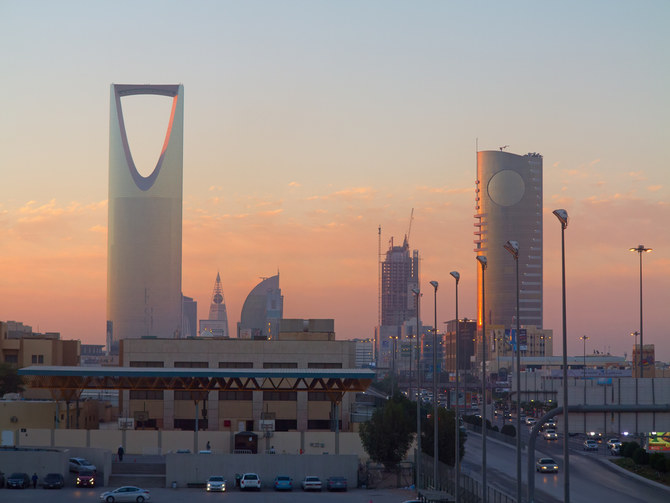
RIYADH: Saudi Arabia’s non-oil exports, including re-exports, saw a surge of 4.4 percent in February compared to the same period of 2023, official data showed.
According to the General Authority for Statistics, the total value of this sector reached SR21.86 billion ($5.83 billion), marking a rise from SR20.93 billion in the same period of the previous year.
The increase in non-oil shipments was driven by an 8.3 percent surge in the exports of rubber and plastic products in February, constituting 24.1 percent of the total exports.
Strengthening the non-oil private sector remains pivotal for Saudi Arabia, as the Kingdom continues its economic diversification efforts aimed at reducing reliance on oil.
The report unveiled a 4.1 percent year-on-year decrease in the Kingdom’s non-oil exports, excluding re-exports, in February. Conversely, the value of re-exported goods surged by 32.3 percent during the same period.
However, GASTAT noted that Saudi Arabia’s overall merchandise shipments decreased by 2 percent in February compared to the year-ago period.
This decline was primarily attributed to a 3.8 percent decrease in oil exports in February compared to the same month in 2023, according to the report.
Similarly, the percentage of oil shipments out of total exports decreased to 77 percent in February from 78.4 percent in the same period of the previous year.
The fall in oil exports was due to the Kingdom’s decision to reduce crude output, aligned with an agreement by the Organization of the Petroleum Exporting Countries, and its allies, collectively known as OPEC+.
In April 2023, Saudi Arabia reduced oil output by 500,000 barrels per day, a decision the Energy Ministry has now extended until the end of December 2024.
Compared to January 2024, the value of overall merchandise exports witnessed a marginal rise of 0.1 percent to SR95.02 billion.
GASTAT revealed that Saudi Arabia’s imports rose by 12.3 percent year on year in February.
On the other hand, the merchandise trade balance surplus decreased by 21.8 percent compared to the year-ago period.
China was Saudi Arabia’s primary trading partner in February, with exports to the Asian country amounting to SR12.57 billion.
India and Japan followed, with SR9.43 billion and SR8.55 billion in exports, respectively.
South Korea, the UAE, and Poland were also featured among the top destinations for Saudi exports, along with Egypt, the US and France.
China also held the top spot on the import side, accounting for 19.9 percent – or SR12.58 billion – of exchanges in February.
According to the report, King Abdulaziz Sea Port in Dammam was ranked the highest entry point for goods into Saudi Arabia, constituting 26.7 percent of the overall exports.


